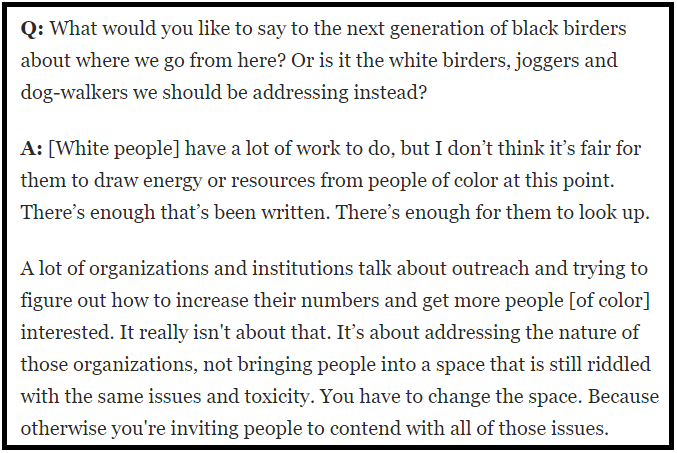 by Liz Bander, LWVWA Director
by Liz Bander, LWVWA Director
When we talk about diversity, equity, and inclusion (DEI), we often spend a lot of time talking about diversity, and how to build a more diverse League. With our Double Up/Double Down campaign in full swing, and Lunell's message on welcoming, I also want to highlight the principle of inclusion, as that is also required for us become a League that is representative of our communities.
After a white woman called police on Black birdwatcher Christian Cooper, in June 2020, The Washington Post interviewed another Black birdwatcher, Walter Kitundu. It has stuck with me ever since, and if you've heard me talk about DEI, you've probably heard me reference it.

The line that I keep coming back to is, "It's about addressing the nature of those organizations, not bringing people into a space that is still riddled with the same issues and toxicity." This is not meant to say the League is a horrible place and we shouldn't welcome new members and leaders—we absolutely should! But we can't expect new people to come in and fix old problems. We need to be willing to do that work ourselves. Making the League more inclusive and equitable will lead to it becoming more diverse.
Inclusion shows up for us individually as grantors and recipients. One example is the one Lunell gave about how someone said they felt welcome because, "I was not introduced as 'one of our younger (or another identity) guests.'" We valued this person not because they made the group more diverse, but because they were Jane or Shanti or Bob—a whole person who had chosen to spend their valuable time with us. Each of us can be inclusive and welcoming, but that's not a complete solution.
Inclusion also shows up systemically, and this is what the above quote really addresses. For example, the League has a long and storied history, but it our history also includes founder Carrie Chapman Catt and others choosing exclusion to focus on white women in getting the 19th Amendment passed. This shows up today when League members wear period costumes to events. Is that welcoming people into today's League? Are we reminding people that our nonpartisan values are 102 years old or that their great-grandmother was purposefully excluded?
This can also show up when we think about our values. One exercise we've used to facilitate values discussions is called "Preferences, Traditions, and Requirements." For example, "education" comes up regularly as a requirement. What do we mean by education? Do we mean a PhD or the ability to thoughtfully discuss issues? Who are the educators? Who should receive education?
Finally, inclusion shows up in how we do our work. Where do we go to register voters? Should we be focusing on registration or should we focus on getting out the vote? Who should we partner with? Are we even the right people to carry the message?
Becoming inclusive as an organization is a continuous process. It involves regular questioning and evaluation. It requires us to sit with discomfort and examine what we thought we were, what we are, and what we want to become. It is also a path that will create the necessary conditions for diversity, and as we double up on membership, I invite you to double down on inclusion.
